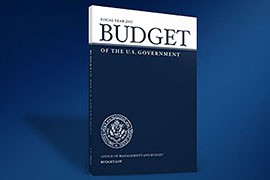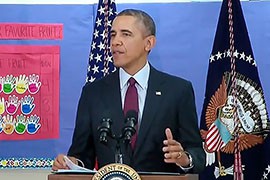Cronkite News has moved to a new home at cronkitenews.azpbs.org. Use this site to search archives from 2011 to May 2015. You can search the new site for current stories.
Lawmakers look for little victories, big flaws in $3.9 trillion budget
WASHINGTON – Good things can come in small packages – even if those small packages ultimately add up to one, big $3.9 trillion package.
That was the size of the fiscal 2015 budget proposed this week by President Barack Obama, which was almost immediately attacked by Republican lawmakers as “disappointing.”
But while some lawmakers were criticizing the top line, others were looking for the little line items, like the $750,000 for a study of a Winslow levee in Rep. Ann Kirkpatrick’s district.
Kirkpatrick, D-Flagstaff, said the big budget is important, but it’s the smaller victories that are “really critical to … people.”
“These projects are about the people, not the politics,” Kirkpatrick said.
But analysts say that when it comes to a lawmaker’s views on the budget, it is about the politics.
David Berman, a senior research fellow at Arizona State University’s Morrison Institute, said in an email that the fact this is an election year is influencing lawmakers’ take on the budget.
Kirkpatrick and other Democrats are “more likely to see value in stressing what the budget does for their district,” said Berman, a professor emeritus of political science at ASU. Republicans, on the other hand, find that their districts are looking for a “dumping on ‘big-spending’ Obama” tack.
And dump they did.
Sen. Jeff Flake, R-Ariz., tweeted Tuesday that Obama’s budget is “another missed opportunity” calling it “long on spending, short on responsibility.”
Rep. Matt Salmon, R-Mesa, called the budget’s proposed increase in taxes and reduction in military spending “disappointing” and “disheartening.”
“House Republicans are willing to work for solutions to the big spending problems facing our nation,” Salmon’s statement said. “The president should work with Congress to find a way to balance the budget and implement real solutions to our nation’s challenges.”
Rep. Paul Gosar, R-Prescott, issued a statement that said “the president doesn’t even try to balance the budget,” making the document “not worth the paper it was printed on.”
Those statements reflect what voters in Gosar’s and Salmon’s “pretty Republican districts” want to hear, said Kyle Kondik of the University of Virginia’s Center for Politics.
“Those guys are going to be re-elected,” Kondik said. Kirkpatrick, on the other hand, has to weigh her response to the budget against what will play in her “very swingy” district, he said.
“She has to do what she thinks is right … for the district and also … to get re-elected,” said Kondik, who is also managing editor at UVa for Larry Sabato’s Crystal Ball.
Kirkpatrick is taking on the task of presenting “herself as a problem-solver” to help with her re-election this fall, Kondik said. While the average voter does not necessarily pay attention to the small victories, it can still be a big victory for a campaign.
But Kirkpatrick said that what Kondik and others may see as a small victory can be a big deal to voters.
The Army Corps of Engineers’ funding for a Winslow levee study, for example, could help remove the Navajo County community from the 100-year floodplain.
Kirkpatrick said the district also got $1.6 million in the fiscal 2015 budget for a Rio de Flag flood control project in Flagstaff and $300,000 for the lower Santa Cruz watershed project in Pinal County.
The largely rural district has “some really critical infrastructure needs,” Kirkpatrick said. As small as it is on a national scale, these small victories are what is “securing the community.”








